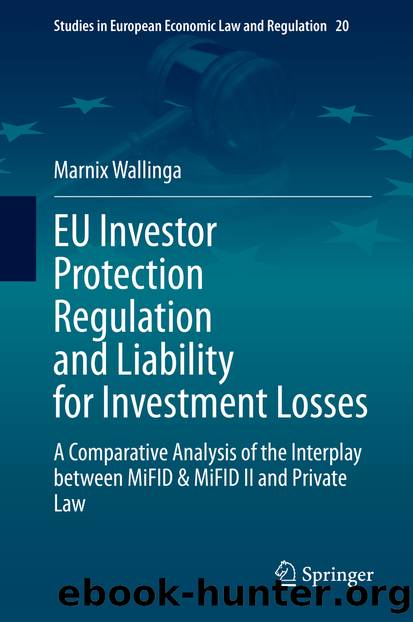EU Investor Protection Regulation and Liability for Investment Losses by Marnix Wallinga

Author:Marnix Wallinga
Language: eng
Format: epub
ISBN: 9783030540012
Publisher: Springer International Publishing
5.4.2.3 Criticism and in Search of the Limits of the Doctrine of Contractual Estoppel
The practice of allowing investment firms to invoke the doctrine of contractual estoppel to minimise their potential liability has been met with criticism in legal literature.259 With the doctrine applied and upheld by English courts,260 the efforts, lacking a decision by the UK Supreme Court on the issue, seem to focus on setting the limits on contractual estoppel. The limits that are most likely to provide retail investors with a degree of protection from contractual estoppel are public policy and the Unfair Contract Terms Act 1977 (hereafter: the âUCTA 1977â). In Springwell, Aikens LJ considered that public policy could provide an exception to contractual estoppel,261 which has more recently been confirmed by Moore-Bick LJ in Globe Motors Inc v TRW Lucas Varity Electric Steering Ltd.262 While it has been said that the authorities available are piecemeal, the cases have been regarded as suggesting that English courts would be prepared to uphold public policy to protect parties who are in a dependent position on their counterparty as a meaningful limit to contractual estoppel.263 Accordingly, retail investors might be able to use the protective aim underlying investor protection regulation, and enshrined in the UK financial supervision framework, to argue for the existence of such a public policy limit on contractual estoppel.264
Furthermore, the UCTA might offer retail investors protection against the doctrine of contractual estoppel by providing for a statutory restriction on exclusion clauses. In the event a contractual term qualifies as an exclusion clause for the purposes of the UCTA, its validity is subject to the reasonableness test (UCTA 1977, s. 11).265 However, terms denying either that investment advice took place or assumption of any responsibility have been commonly branded basis clauses rather than exclusion clauses, causing such terms to fall outside the UCTA control.266 The distinction was contemplated in Springwell,267 where Aikens LJ fell back on the decision by Clarke J in Raiffeisen.268 Courts have considered contractual terms as basis clauses when these terms define the partiesâ relationship by providing for the basis on which they have entered into that relationship and on which they are dealing.269 In particular McMeel has criticised this distinction, arguing that basis clauses should be exposed for what they in fact amount to: exclusion clauses, which would subject such terms to the statutory control of the UCTA.270 In this regard, some have suggested that in the context of investment transactions involving ordinary, retail investors, there is a more substantial discussion as to whether a contractual term is a basis or an exclusion clause.271 It has been proposed that the UCTA could indeed provide for an important possibility for retail investors, and other non-sophisticated counterparties, to escape the consequences of contractual estoppel.272 Recent authorities seem to suggest that the time of basis clauses defeating investor claims through contractual estoppel may be coming to an end.273
The Court of Appeal decision in First Tower Trustees v CDS offers the first sign that the judiciaryâs approach to the effect of basis clauses on the ability of investors to obtain redress could indeed be changing.
Download
This site does not store any files on its server. We only index and link to content provided by other sites. Please contact the content providers to delete copyright contents if any and email us, we'll remove relevant links or contents immediately.
Rich Dad Poor Dad by Robert T. Kiyosaki(6633)
Pioneering Portfolio Management by David F. Swensen(6301)
How To Win Friends and Influence People by Dale Carnegie(4513)
The Money Culture by Michael Lewis(4207)
The Dhandho Investor by Mohnish Pabrai(3765)
The Wisdom of Finance by Mihir Desai(3748)
Liar's Poker by Michael Lewis(3449)
Fooled by Randomness: The Hidden Role of Chance in Life and in the Markets by Nassim Nicholas Taleb(3124)
The ONE Thing by Gary Keller(3071)
Mastering Bitcoin: Programming the Open Blockchain by Andreas M. Antonopoulos(3045)
The Intelligent Investor by Benjamin Graham Jason Zweig(3041)
The Psychology of Money by Morgan Housel(3036)
Rich Dad Poor Dad: What The Rich Teach Their Kids About Money - That The Poor And Middle Class Do Not! by Robert T. Kiyosaki(2958)
Investing For Dummies by Eric Tyson(2954)
How to Day Trade for a Living: Tools, Tactics, Money Management, Discipline and Trading Psychology by Andrew Aziz(2949)
How to Win Friends and Influence People by Dale Carnegie(2915)
Market Wizards by Jack D. Schwager(2701)
How to Pay Zero Taxes, 2018 by Jeff A. Schnepper(2655)
Zero Hour by Harry S. Dent Jr. & Andrew Pancholi(2649)
